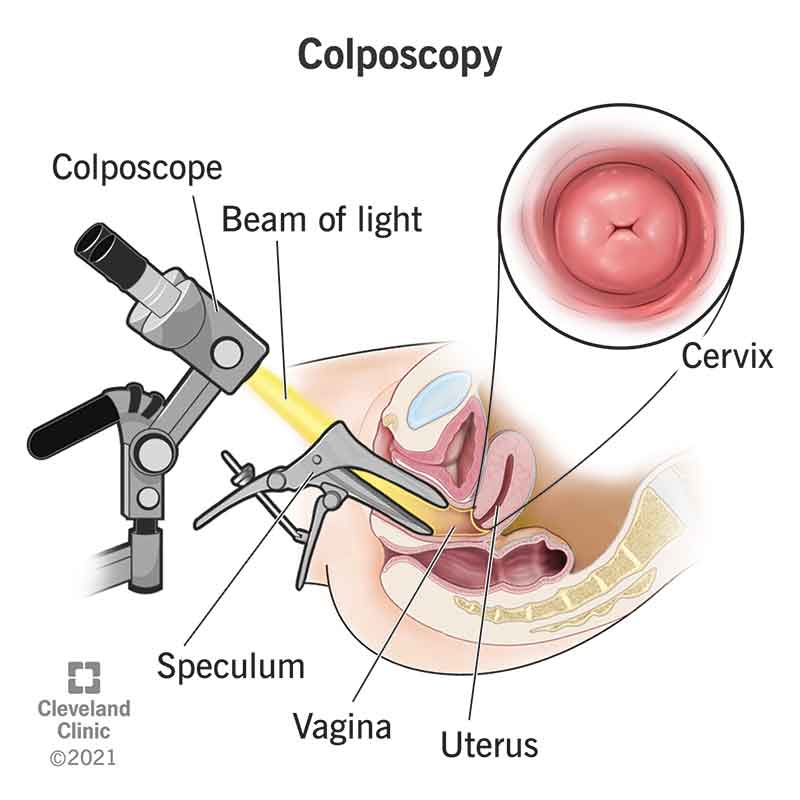A nurse is teaching a client who is scheduled for a colposcopy tomorrow. Which of the following statements should the nurse include in the teaching?
"This procedure is routinely performed during a Pap test."
"During the procedure, a biopsy may be performed."
"Do not eat or drink after midnight tonight."
"You will have general anesthesia during this procedure."
The Correct Answer is B
Choice A reason:
The statement "This procedure is routinely performed during a Pap test" is incorrect. A colposcopy is not routinely performed during a Pap test; it is a separate procedure that is often recommended if a Pap test shows abnormal results. The colposcopy allows for a closer examination of the cervix, vagina, and vulva to detect any signs of disease.
Choice B reason:
The statement "During the procedure, a biopsy may be performed" is correct. If the healthcare provider sees an area of concern during the colposcopy, they may take a small sample of tissue (biopsy) from the cervix or from inside the opening of the cervix.
Choice C reason:
The statement "Do not eat or drink after midnight tonight" is not necessary for a colposcopy. Unlike some surgical procedures that require general anesthesia, a colposcopy is usually done with local anesthesia, and fasting is not required.
Choice D reason:
The statement "You will have general anesthesia during this procedure" is incorrect. General anesthesia is not typically used for a colposcopy. The procedure may cause some discomfort, but it is usually performed using local anesthesia or no anesthesia at all.

Nursing Test Bank
Naxlex Comprehensive Predictor Exams
Related Questions
Correct Answer is D
Explanation
Choice A reason:
Dyspepsia, commonly known as indigestion, is not typically associated with SIADH. It is a condition characterized by chronic or recurrent pain in the upper abdomen and is not linked to the overproduction of antidiuretic hormone.
Choice B reason:
Osteoarthritis is a degenerative joint disease and does not cause SIADH. It is characterized by the breakdown of joint cartilage and underlying bone, most commonly from middle age onward, causing pain and stiffness, especially in the hip, knee, and thumb joints.
Choice C reason:
Liver cirrhosis can lead to complications that may contribute to fluid imbalance, but it is not a direct cause of SIADH. SIADH is more commonly associated with conditions that affect the central nervous system or certain types of cancer.
Choice D reason:
Lung cancer, particularly small cell lung cancer, is a well-known cause of SIADH. Tumors in the lungs can produce and release antidiuretic hormone independently, leading to the syndrome of inappropriate antidiuretic hormone secretion.
Correct Answer is A
Explanation
Choice A reason:
Hysterosalpingography (HSG) is typically scheduled after menstruation but before ovulation to ensure that the client is not pregnant during the procedure. Scheduling the procedure 5 days prior to menstruation would not be appropriate as it could interfere with the menstrual cycle and the potential early stages of pregnancy.
Choice B reason:
Diarrhea is not a common side effect of HSG. The procedure involves the insertion of a dye into the uterine cavity to visualize the fallopian tubes and uterus via X-ray. While some discomfort, cramping, or spotting may occur, diarrhea is not typically expected.
Choice C reason:
There is no requirement for a client to be on a liquid diet following an HSG procedure. The client can usually resume normal activities and diet immediately after the procedure unless otherwise instructed by their healthcare provider.
Choice D reason:
Shoulder pain is not a typical symptom following HSG. While referred pain to the shoulder can occur with procedures that involve the diaphragm or abdominal cavity, HSG is focused on the reproductive organs and should not cause shoulder pain.
Whether you are a student looking to ace your exams or a practicing nurse seeking to enhance your expertise , our nursing education contents will empower you with the confidence and competence to make a difference in the lives of patients and become a respected leader in the healthcare field.
Visit Naxlex, invest in your future and unlock endless possibilities with our unparalleled nursing education contents today
Report Wrong Answer on the Current Question
Do you disagree with the answer? If yes, what is your expected answer? Explain.
Kindly be descriptive with the issue you are facing.
